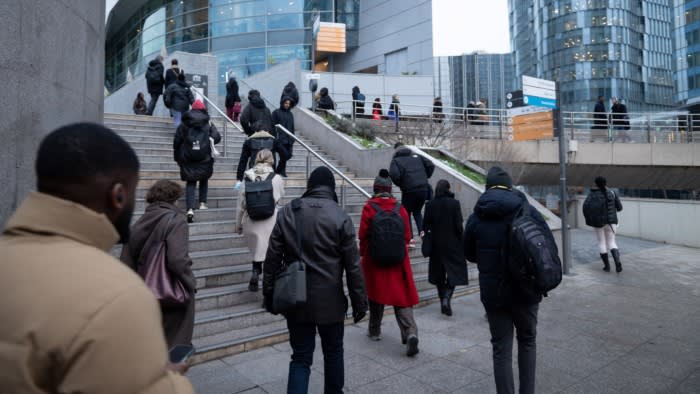Unlock the Editor’s Digest for free
Roula Khalaf, Editor of the FT, selects her favourite stories in this weekly newsletter.
The eurozone’s collective wage growth has slowed for the first time in 18 months, but economists said the decline was unlikely to be enough to ease rate-setters’ concerns over high inflation.
Data released by the European Central Bank on Tuesday showed annual rises in collectively negotiated pay for workers in the bloc increased 4.5 per cent in the last three months of 2023, compared with 4.7 per cent in the previous quarter.
The first slowdown in the figure since the second quarter of 2022 comes after ECB policymakers said they wanted clear evidence of wage pressures moderating and not being passed on via higher prices before they would consider cutting interest rates.
However, the rate remains above the 3 per cent level that the ECB has said is consistent with inflation falling to its 2 per cent target, after adjusting for productivity improvements.
“The all-clear cannot be given,” said Marco Wagner, economist at German lender Commerzbank. “There is still much to suggest that inflation will ultimately stabilise above the ECB’s 2 per cent target.”

For more than two years, workers across Europe have seen their purchasing power decline during the biggest surge in inflation for a generation triggered by Russia’s full-scale invasion of Ukraine. Many are now demanding significant pay increases to catch up with higher living costs.
ECB president Christine Lagarde said last week that wages were “an increasingly important driver of inflation dynamics in the coming quarters” as she told EU lawmakers this meant the central bank would avoid “hasty decisions” on cutting rates.
The slowdown in collective wage rises adds to signs that pay pressures are starting to ease. A separate tracker of salaries on new jobs by website Indeed declined for much of last year, although it picked up again in January. Recent surveys found businesses were hiring less and cutting more staff, while job vacancies have fallen.
Jack-Allen Reynolds, economist at consultants Capital Economics, said negotiated wage growth was “arguably not as strong as it seems” after sharp slowdowns in Germany and France were partly masked by a big rise in Italy because of the advanced payment of 2024 wages at the end of last year.
But he admitted the slowdown was “unlikely to be enough” to convince the ECB that wage pressures were moderating fast enough to justify cutting rates in April as he had forecast.
Eurozone inflation has fallen from a record 10.6 per cent in October 2022 to 2.8 per cent in January. But unemployment in the bloc remains at a record low of 6.4 per cent and several ECB policymakers have said they want to see first-quarter wage data, which is only due out after their April meeting, before starting to discuss a potential easing of monetary policy from the current benchmark deposit rate of 4 per cent.
Markets now expect the ECB to make its first quarter-point rate cut by June, with three further reductions to follow later in the year.
Isabel Schnabel, an ECB executive board member, told the Financial Times this month that labour costs were being pushed higher by a “worrying” recent decline in productivity — as measured by output per hour worked — caused by a mix of labour hoarding, integration of “less productive workers” into the workforce and increased sick leave.
Tomasz Wieladek, economist at investor T Rowe Price, said there could still be a reacceleration of collective wage growth in the first quarter as German data for the previous three-month period did not include the one-off payments that many companies gave workers in December.
This factor made “ECB policy challenging”, said Wieladek, adding: “If the first-quarter 2024 reading of negotiated wages challenges the narrative that wage growth is decelerating, then the [ECB] governing council may wait later than June to start the cutting cycle.”
